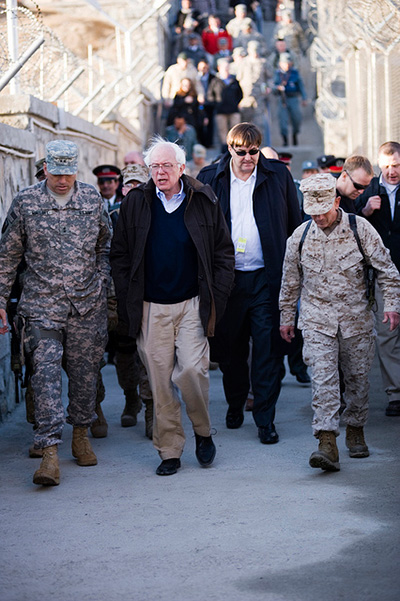As
Katrina vanden Heuvel wrote in December, “The conventional wisdom
is that [Hillary] Clinton benefits as voters grow more concerned about national security and terrorism. She is the most experienced of all the candidates.” But, vanden Heuvel argued, “as we have seen on domestic issues, experience is a mixed blessing
when fundamental judgments have been wrong and counterproductive.”
It would appear that most members of MoveOn agree with vanden Heuvel on this point.
On January 12, MoveOn reported that Bernie Sanders had won their endorsement, with more than 78 percent of the vote in an online poll with record turnout. Hillary Clinton
received 14.6 percent and Martin O’Malley received 0.9 percent, with 5.9 percent of votes cast in favor of not endorsing.
One of the top five reasons given by MoveOn members for endorsing Sanders was “He’ll say no to permanent war.” One MoveOn member wrote, “He was also right about Iraq and I prefer his
stance on foreign policy. I feel that he is concerned with getting our country on track and not getting us in more wars.” Another cited Sanders’ backing for “peaceful solutions to prevent war, such as his support for the Iran deal.”
Reporting on the top five reasons, Ilya Sheyman, Executive Director of MoveOn.org Political Action, wrote:
Bernie Sanders has been a strong, consistent voice for the principle that war should always be a last resort. He had the foresight to vote against authorizing the war in Iraq in 2002, was a strong supporter of the nuclear deal to prevent war with Iran,
and has been a voice of reason against escalation in Syria and other conflicts around the world.
A diplomacy-first foreign policy has long been one of MoveOn members’ top priorities, and Bernie has consistently stood with us against costly, needless, and unwise military escalation that puts our nation’s security and values at risk.
TheNew York Times reported that the MoveOn endorsement of Sanders was “not a surprise, given the time that the group
has spent trying to find someone who could be a strong challenger to Mrs. Clinton from the left,” referring to the earlier MoveOn effort to draft Sen. Elizabeth Warren to run. But the Times then noted: “where the endorsement could be helpful is
in motivating volunteers and supporters to make calls and rally voters on Mr. Sanders’s behalf.”
MoveOn reports that it has 43,000 members in Iowa. The record turnout in the 2008
Iowa Democratic caucus was 239,000; turnout in 2004 was 125,000.
A January 12 Quinnipiac University poll which generated headlines found that Sanders had the support of 49 percent of
“likely Democratic Caucus participants,” with 44 percent for Clinton, 4 percent for O’Malley, 3 percent undecided. The previous December 15 Quinnipiac poll found Clinton at 51 percent, with 40 percent for Sanders. Ignoring margin of error and assuming
that all those numbers were accurate, the headlines were generated by the movement of roughly 8 percent of “likely Democratic Caucus participants,” from Clinton to Sanders. If 2016 turnout is more like 2008 turnout, that’s about 20,000 people. If 2016
turnout is more like 2004 turnout, that’s about 10,000 people. Supposing that the national MoveOn vote to endorse Sanders was roughly reflective of MoveOn members in Iowa, there’s some 30,000 MoveOn members in Iowa who are already likely Sanders supporters
and just need a friendly and familiar voice to nudge them to show up. Thus, the headline-generating shift in the polls in Iowa is of the same order of magnitude as the number of Sanders supporters in Iowa that MoveOn can plausibly move to show up to
the caucuses.
This suggests that the result of the Iowa caucus could upend not only the national media narrative about the candidates, but also the national media narrative about what Democratic voters are looking for from candidates on foreign policy. If Sanders wins
Iowa with MoveOn’s support, then MoveOn could use this to credibly claim, as vanden Heuvel suggested, that on foreign policy Democratic voters don’t value “experience” right now as much as they value “not getting us in more wars” and “peaceful solutions
to prevent war,” like the Iran deal.
Join us in defending the truth before it’s too late
The future of independent journalism is uncertain, and the consequences of losing it are too grave to ignore. To ensure Truthout remains safe, strong, and free, we need to raise $44,000 in the next 6 days. Every dollar raised goes directly toward the costs of producing news you can trust.
Please give what you can — because by supporting us with a tax-deductible donation, you’re not just preserving a source of news, you’re helping to safeguard what’s left of our democracy.
